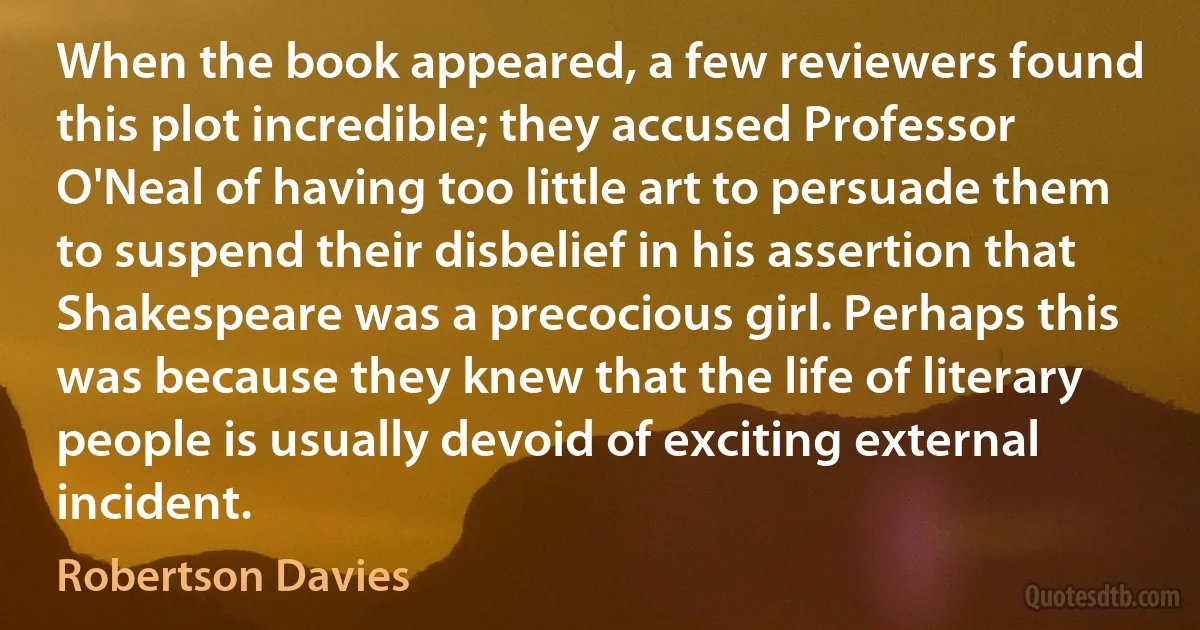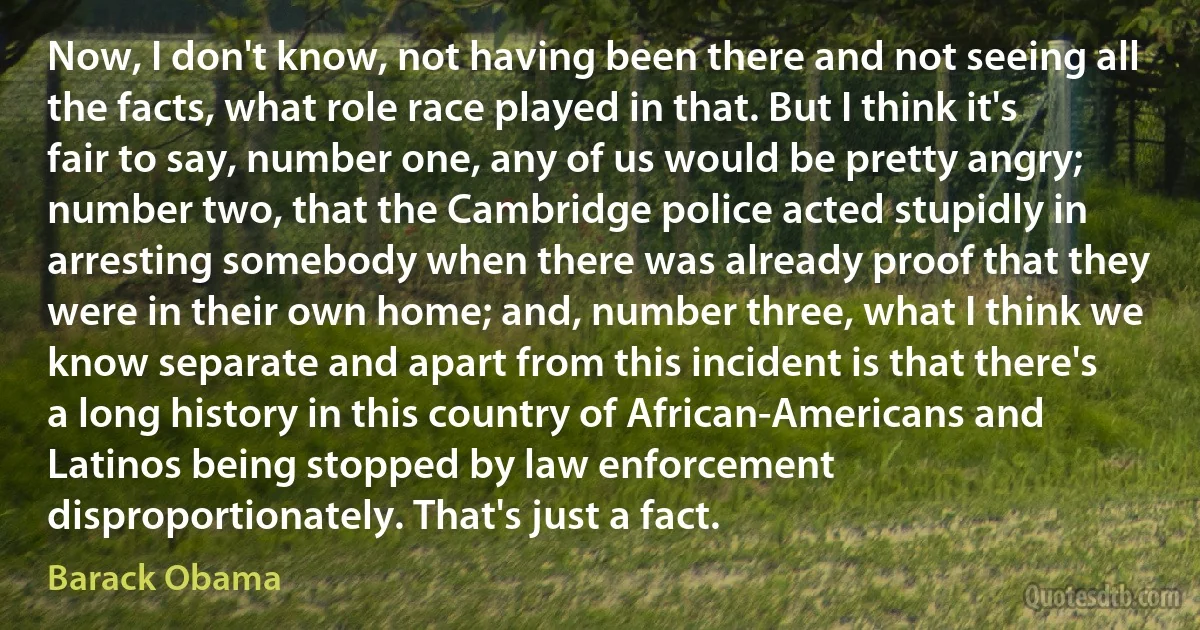Incident Quotes - page 4
blogging over serious aspects can really affect the changes. As for e. g. there was an incident of 26/11 terrorist attack which was seriously taken up by the bloggers and the blog world and bloggers (specially Hindi bloggers) seriously expressed their grave concern over it and finally the result is in front of you. Like wise there is another example of homosexuality last year. When live in relationship was being promoted. Then also the blog world took up that matter seriously and the result is before you.

Ravindra Prabhat
I very nearly died. Of course, everyone thought I was acting, even the person doing the strangling. But actually I was dying. Luckily someone noticed the froth coming out of my mouth and knew something was wrong. I wasn't that spooked by the incident. But when they told me I had been out for a while, I wanted to make sure I wouldn't have any long term damage because I didn't know how long the oxygen had been cut off to my brain. But I was fine apart from a couple of rope burns. That's what happens when you take art to extremes.

Hugo Weaving
In our secret depths, wherever we do our unspoken wishing, either we want life to be tidy, clear, fully understood, contained within definite limits, or we long for it to seem larger, wilder, stranger. Faced with some odd incident, either we wish to cut it down or to build it up.
On this level, below that of philosophies and rational opinions, either we reject or ignore the unknown, the apparently inexplicable, the marvellous and miraculous, or we welcome every sign of them. At one extreme is a narrow intolerant bigotry, snarling at anything outside the accepted world-picture, and at the other is an idiotic credulity, the prey of any glib charlatan. At one end the world becomes a prison, at the other a madhouse.

J. B. Priestley
The Christians mistake an incident for a cause, and honestly imagine that the Bible is the foundation of modern liberty and law. They forget physical conditions, make no account of commerce, care nothing for inventions and discoveries, and ignorantly give the credit to their inspired book.

Robert G. Ingersoll
There was nothing like a museum for calming the mind, for putting the problems of everyday life in their true perspective. Here, surrounded by the infinite variety and wonder of Nature, he was reminded of truths he had forgotten. He was only one of a million million creatures that shared this planet Earth. The entire human race, with its hopes and fears, its triumphs and its follies, might be no more than an incident in the history of the world.

Arthur C. Clarke
There is no author to whom my father thought himself more indebted for his own mental culture, than Plato, or whom he more frequently recommended to young student. I can bear similar testimony in regard to myself. The Socratic method, of which the Platonic dialogues are the chief example, is unsurpassed as a discipline for correcting the errors, and clearing up the confusions incident to the intellectus sibi permissus.

John Stuart Mill
But at first we must necessarily meet with the inconveniences and difficulties and embarrassments incident to all changes of government. These will be felt in our postal affairs and changes in the channel of trade. These inconveniences, it is to be hoped, will be but temporary, and must be borne with patience and forbearance.

Alexander H. Stephens
[H]e was genuinely incapable of uttering a single sentence that was not a cliché.[...] Eichmann, despite his rather bad memory, repeated word for word the same stock phrases and self-invented clichés (when he did succeed in constructing a sentence of his own, he repeated it until it became a cliché) each time he referred to an incident or event of importance to him.[...] The longer one listened to him, the more obvious it became that his inability to speak was closely connected with an inability to think, namely to think from the standpoint of somebody else. No communication was possible with him, not because he lied but because he was surrounded by the most reliable of all safeguards against the words and the presence of others, and hence against reality as such.

Hannah Arendt
What I did was mild compared to what Durocher did to Conlan. I don't see how what I did can be called more serious than the Durocher incident. I had good reason to lose my head. That was the second time they call me out on a play I thought I had beat. That's enough to make anybody mad.

Roberto Clemente
Yasuji Okamura, commander of the Japanese forces in China, had this to say about the Chinese Nationalist Army: "The center of resistance was neither the four hundred million Chinese civilians, nor the two million-strong ragtag army composed of local troops. Instead, it was the Central Army, led by the young officers of the Whampoa Military Academy, with Chiang Kai-shek at its nucleus. In numerous major battles, the Central Army not only was the main force engaged in combat, but also oversaw the local troops who were increasingly losing the will to fight. The Central Army kept the local troops from wavering. As seen, training by Whampoa was thorough, and it was impossible to resolve the China Incident peacefully with the existence of such an army.

Yasuji Okamura
The greatest reason for Japan's participation in the Triple Alliance lies in the fact that the three signatory powers, at this time of great change in the world situation, have the same position, the same interest, and entertain the same political views. China is not Japan's real enemy in the present incident. In reality Japan is fighting Britain and America. The first thing we are now required to do is to carry out our southward advance.

Toshio Shiratori
The Times Square Incident wasn't a terrorist attack, it was a Jim Carrey movie. The terrorist locked the keys to the safe house he was going to escape to in the carbomb. And I love that he locked the carbomb. Nobody's getting my Ipod. Then he left the keys to carbomb hanging out of the tailgate of the carbomb, and built the carbomb out of fertilizer that wouldn't explode. I have been doing comedy for 25 years and I have never been that funny.

Christopher Titus
I appreciated the sense of drama he wanted to inject into my existence and I was flattered that he thought I, or at least some essential if somewhat abstract principle within me, was worth saving.I also felt surging within me a fierce need to be independent. Of course I responded to the appeal of divine hydraulics, this system of souls damned or crowned or destroyed or held in suspense, these pulleys and platforms sinking and lifting on the great stage, and I recognized that my view of things seemed by contrast impoverished, lacking in degree and incident. But the charming intricacy of a myth is not sufficient to compel belief. I found no good reason to assume that the ultimate nature of reality happened to resemble the backstage of an opera house.

Edmund White
Moreover, in Christ's second discourse, the mode in which the mention of Jonas is understood in Matthew, verse 40, is wholly unsuited to the context and to the application which even there is made of it; and if we do not take this for a later interpolation, for which no adequate inducement suggests itself, it must be considered as an erroneous comment of the reporter, which he has mixed up with Christ's own words, of course without being conscious of it, a thing which might easily happen when his recollection had become dim and confused. In addition to the signs already adduced of Matthew's reporter having been so circumstanced comes the fact, that he omits the little incident related in Luke, which intervenes between Christ's two discourses, namely, the admiring ejaculation of a woman in the crowd and the reply to it.

Friedrich Schleiermacher
These Chinese novels are not perfect according to Western standards. They are not always planned from beginning to end, nor are they compact, any more than life is planned or compact. They are often too long, too full of incident, too crowded with character, a medley of fact and fiction as to material, and a medley of romance and realism as to method, so that an impossible event of magic or dream may be described with such exact semblance of detail that one is compelled to belief against all reason.

Pearl S. Buck
The research questions that motivate most quantitative studies in the health, social and behavioral sciences are not statistical but causal in nature. For example, what is the efficacy of a given drug in a given population? Whether data can prove an employer guilty of hiring discrimination? What fraction of past crimes could have been avoided by a given policy? What was the cause of death of a given individual, in a specific incident? These are causal questions because they require some knowledge of the data-generating process; they cannot be computed from the data alone.

Judea Pearl



